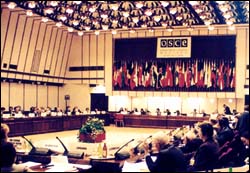
|

Disarming the Intolerant
Pockets of religious intolerance are the land mines thwarting democratic progress in Western Europe; U.S. human rights leaders urge dialogue and compliance with international conventions.
by Peter Mansell

n its annual human rights report issued in February, the United States Department of State echoed concerns being raised throughout the international human rights community over the menacing trend of religious intolerance in Europe.
Back-to-back reports from the State Department, the United Nations Special Rapporteur on Religious Intolerance and the International Helsinki Federation for Human Rights (IHF) particularly describe increasing governmental violations of human rights conventions with respect to religious freedom.
“Even among countries that claimed to respect religious freedom, abuses continued,” the U.S. State Department report noted, mentioning Russia’s 1997 law which blatantly restricts religious practice. “Despite their commitment to the principle of religious freedom, several European countries have similarly begun to respond to a perceived fear of ‘sects’ with actions that discriminate unfairly against new or minority religious beliefs,” the report continued, with specific reference to Germany and France.
And in a report prepared for a meeting of the Organization for Security and Cooperation in Europe (OSCE) in March 1999, the IHF cogently remarked on the discrepancy between many OSCE member nations’ commitments to the Universal Declaration of Human Rights, and reality.
“In practice,” the IHF notes, “a high proportion of OSCE governments have either clearly violated this declaration, or contributed to increasing religious intolerance. Numerous states—East and West—have adopted restrictive domestic laws on religious associations ... or taken other steps to restrict the spread of ‘new religions’....”
The rise of state-sanctioned religious intolerance signals the advance of extremist and radical political factions—a larger threat to democratic progress in Europe.
Elements of Intolerance
The elements of religious intolerance in Europe were well defined in Warsaw late last year by the United States and European Delegations to the annual conference of the OSCE, one of the most important bodies of the international human rights community.
The delegates as well as non-governmental advisors at the 500-member conference pointed to two prominent signs of intolerance: new laws which intentionally hinder the free exercise of minority religions, and government “information centers” which, rather than information providers, are essentially propaganda agencies set up to provoke intolerance. In some cases they are not only extensions of the government, but also of the state religions which feel threatened by the growth of newer religions.
Russia and Austria are prime examples of countries in which laws with respect to religion have been passed in violation of human rights commitments. The laws create two distinct classes of religious groups and favor traditional churches in acquiring legal status and privileges.
The Russian law, signed into effect in September 1997, institutes harsh restrictions on all religious groups outside the Russian Orthodox Church—which receives full legal protection and state benefits—and traditional Christian, Muslim, Jewish and Buddhist denominations, which receive full legal protection but fewer state benefits. All other religious groups receive only a pro forma guarantee of freedom of worship and liberty of conscience.
“The law is in clear violation of the Russian constitution,” noted the IHF in its March report to the OSCE.
The most controversial provisions of the law are those which limit the rights, activities, and status of religious groups existing in Russia for less than 15 years prior to the date of the law’s passage. Unregistered groups which cannot demonstrate that they have been in existence in Russia for 15 years may be registered but are denied rights and privileges; groups registered prior to the law but which were not in existence in Russia for 15 years must re-register every year until a 15-year period expires.
Under the Austrian law, 12 specified religions satisfy the prerequisites to gain religious recognition. All remaining religious groups seeking legal status must undergo a period of government observation during which “legal status is denied and the religious organization is liquidated if the government ascertains that the beliefs of the group violate, among other criteria, democratic interests, public security, etc.,” as noted in the presentation of the U.S. Delegation to the annual OSCE conference at the close of 1998.
Political Intolerance
Another serious concern being raised by human rights leaders is the escalation of intolerance in Western European parliaments, notably in France, Belgium, Austria and Germany. The annual human rights reports have rebuked recent parliamentary investigations and reports from these countries for their detrimental effect on religious liberty.
Particular attention has been drawn to France and their creation of an Interministerial Mission to Battle Against Sects. “The very name of this mission,” as aptly noted by the OSCE delegates, “suggests confrontation with religious minorities rather than tolerance.”
The establishment of government centers to monitor and “inform” on religious groups violates the fundamental principle of separation of Church and State, and subsequent biased reports issued by them fuel intolerance on a national level.
The U.S. OSCE delegation rebuked recent parliamentary investigations and reports from certain European countries for their “detrimental effect on religious liberty.”
|
|
Germany in particular in recent years has received a lion’s share of criticism from the international human rights community for increasing persecution of minority religions. Human rights leaders fear the country sets a dangerous trend in Western Europe, notably due to the direct and visible involvement of senior politicians in discriminatory acts.
Among the most insidious tools of discrimination in Germany are “sect filters,” mandatory declarations in which potential or current employees must declare they are not affiliated with a minority religious group—or lose their job or be denied employment. The “filters” blatantly contravene European human rights standards. Several German businesses and subsidiaries of major U.S. corporations in Germany, including Ford, IBM and GE Capital, have recently condemned the use of such declarations.
Discrimination against religions in Germany’s business sector was instigated by decrees of the former Minister of Labor Norbert Bluem, a high-ranking leader of the Christian Democratic Union who was voted out of office in the 1998 elections. Bluem policies have been ruled by courts to be unlawful. One of the most significant decisions to date occured at the end of January 1999 when the Rhineland-Palatinate state Court of Appeals in Mainz ruled that the 1994 denial of a Scientologists’ license to operate an au pair agency—denied solely on the basis of the woman’s religion—was blatantly illegal.
Dialogue Urged
International human rights leaders urge constructive dialogue as an essential element to disarming intolerance and gaining lasting compliance with human rights conventions and treatises.
As a step toward this process, the Church of Scientology European Human Rights Office, a Non-Governmental Organization, sponsored renowned German scholar Dr. Gabriele Yonan, Association of German-Speaking Muslims of Berlin president Mohammed Herzog, and American actress, Scientologist and human rights advocate Anne Archer to address representatives from international religious and humanrights bodies in Warsaw, among them Council ofEuropean Churches, Council of World Churches, University of Essex, Human Rights Without Frontiers, the U.S. and German delegates to the OSCE and the U.S. State Department.
The speakers especially urged that German Chancellor Schroeder and the new German government reverse the trend in Europe—by bringing to an end human rights violations against German religions that were enforced by the previous CDU government, and by agreeing to dialogue.
“We implore you to have the incoming heads of your federal departments review the policies relating to religious minorities created by their predecessors,” said Archer. “We urge that you immediately cancel all discriminatory decrees, decisions and measures.”
The United States Delegation to the OSCE conference concluded that the “blanket condemnation of... any marginalized group, is not only a violation of Helsinki principles, but is counterproductive and dangerous policy. “Government cannot and should not control all aspects of society and certainly not matters of faith. [Government] must accept religious groups as a positive, integral part of society.”
As the annual reports of the international human rights community indicate, more European nations must learn to put such concepts into practice in achieving a unified, democratic whole for Europe.
|

|










